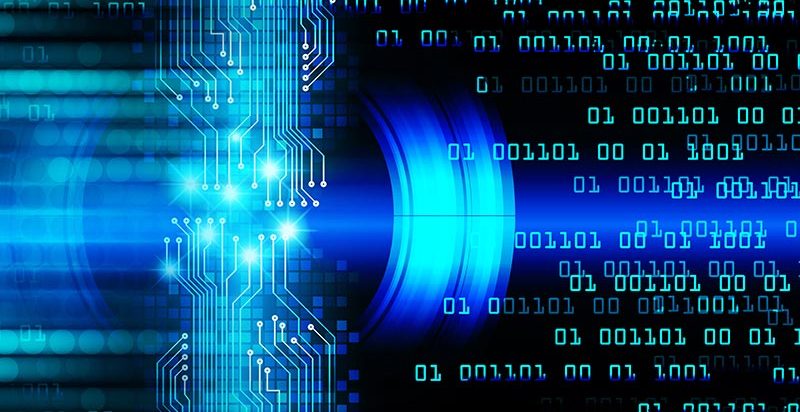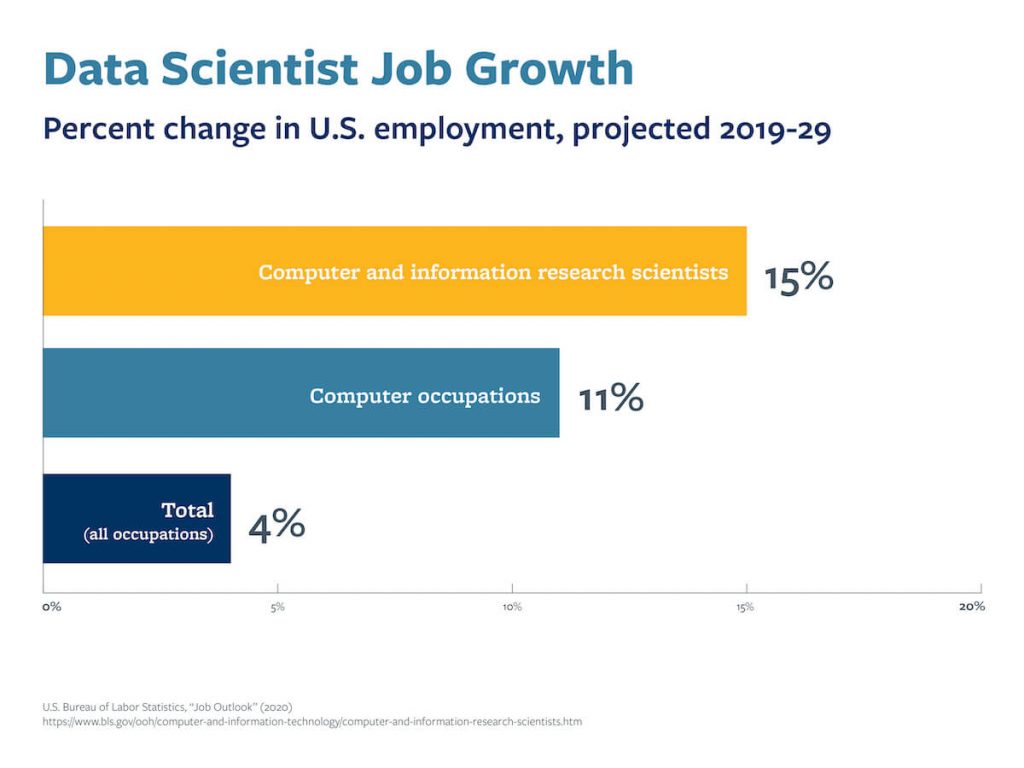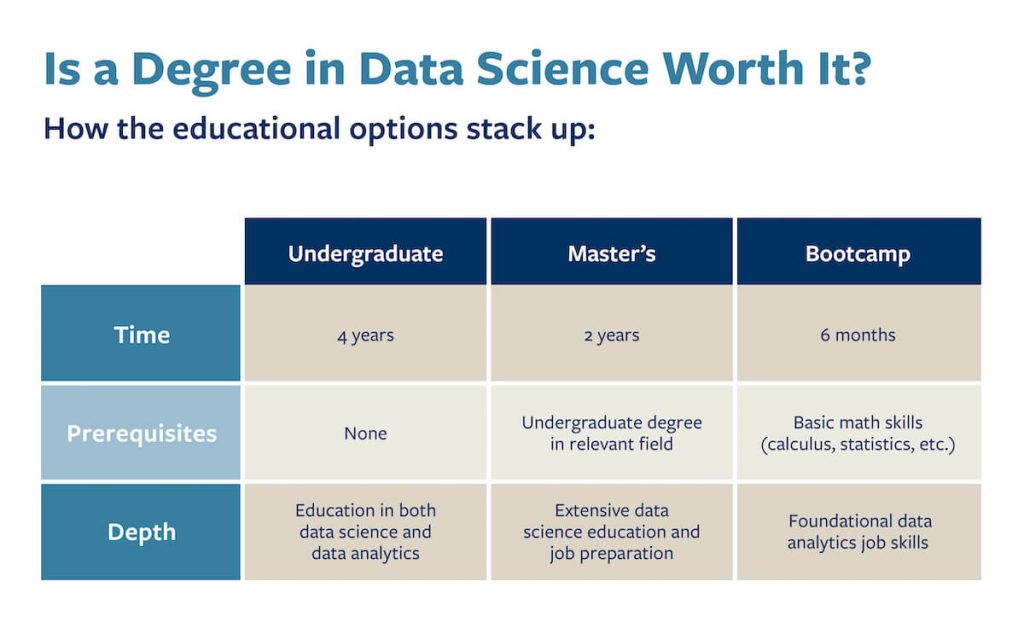Is a Degree in Data Science Worth It? Pros, Cons & Alternatives to Consider

Everything we produce, buy, sell and consume leaves a data trail. Companies need data scientists to develop, produce and ship their products more efficiently. Cities look to data scientists to make them more livable. Professional sports teams employ data scientists to give them a championship edge. Data shapes so much of our lives, and yet few people know how to use and interpret it.
Data scientists can make sense of what appears random and chaotic, applying their expertise to turn data into actionable insights that their employers can use to make better strategic decisions.
If this sounds enticing, a data scientist role might be the right fit for you. But since there are different paths to becoming a data scientist, you might be wondering: Is a data science degree worth it?
Many data scientists would respond with a resounding yes, but the pros and cons are worth considering. Below, we’ve provided a detailed overview of the types of data science degrees available, the benefits and drawbacks of pursuing them and options for those seeking alternative paths.
What Type of Degrees in Data Science Are There?
There are several academic paths a tech-savvy learner can take into data science. Most of them involve formal college learning.
The traditional bachelor’s degree program is a common avenue, though some students might also choose to extend their coursework with a Master’s of Information and Data Science. Years and years of study aren’t strictly necessary, however. Shorter certificate programs are valuable for professionals who want either a deeper understanding of their business or to embark on a career change.
What are your options? Here’s an overview.
Bachelor of Arts in Data Science
Time Commitment: 4 years
Data science degrees provide students with the technical skills they need to analyze data and develop actionable conclusions from those assessments. The coursework of such programs typically emphasizes programming, statistics, math and some elements of social science.
Generally speaking, students will declare a “domain emphasis” in which to apply their research. Potential domains include several prominent disciplines, including neuroscience, robotics, social policy and law. By doing so, graduates can tailor their data studies to address needs in fields such as medicine, community infrastructure and environmental studies.
Master’s Degree in Data Science
Time Commitment: ~2 years, depending on the learner’s schedule and previous education
A master’s in data science is valuable to those who want to become leaders in the field. Students dig deeper into how to study and harness accumulated data, including large, complex sets known as “Big Data.”
At UC Berkeley, for instance, the Master of Information and Data Science (MIDS) program offers a rigorous curriculum that focuses on critical areas such as research design, data engineering, machine learning, ethics and privacy, among others. Students use the latest analytic tools to interpret data and, just as important, communicate their findings to achieve results.
This online program is designed to be completed in 20 months, though scheduling is flexible. Students undertake 27 course units over 3–5 terms, and the program includes an immersive campus experience with workshops and networking events.
Data Science Short Course
Time Commitment: 6 weeks
The six-week Data Science Essentials Online Short Course is a certificate program designed for leaders seeking a stronger grasp of the role data play in their businesses. The course is held entirely online with flexible modules consisting of 8–10 hours of study per week and covers the principles and applications of data science, as well as its use in business strategy. No technical background is required, making it a smart entry point for newcomers to data science.
Data Analytics Bootcamp
Time Commitment: 6 months
Berkeley Data Analytics Boot Camp is a 24-week certificate curriculum concentrating on market-based skills such as Excel, the Python programming language, statistical modeling and front end web visualization. Students who complete the online program acquire tools relevant to multiple professional environments such as programming, cybersecurity and other tech fields.
Bootcamps afford students and business professionals the opportunity to apply analytics to their current fields or explore new career avenues. Enrolling in a bootcamp could be a great way to gain a baseline understanding of analytical principles before pursuing further education.
Get Program Info
What Does a Degree in Data Science Curriculum Typically Include?
Do you enjoy working with arrays, trees, heaps and hashes — or, at the very least, want to know what those terms mean? These structures are essential to data science and will form the backbone of your coursework, regardless of the educational avenue you pursue.
Students of data science first acquire a strong base in math — calculus and linear algebra are particularly vital — and computer science before mastering the field. Coding, data visualization and working with unstructured data will also be necessary. Courses in probability, machine learning and modern statistical prediction further add to the curriculum’s technical foundations.
Soft skill training is an important part of an aspiring data scientist’s undergraduate education, too. For example, data scientists must also be able to communicate their findings clearly to an audience that does not read code or interpret arrays. Moreover, because they must understand the ethical implications of data science, BA programs often include coursework relating to moral and societal questions relevant to the field.
Students may also participate in a “domain emphasis” designed to enhance their data studies. Essentially, students choose courses from several disciplines and learn the nuances of how data science is used in those domains. By doing so, students link their data studies to real-world applications.
Domain opportunities cover a variety of disciplines to which data science has become integral. These may encompass:
- Applied mathematics and modeling
- Cognition
- Ecology and the environment
- Human behavior and psychology
- Social welfare, health and poverty
- Urban science
Students who pursue a master’s degree in data science will immerse themselves deeper into the field. The curriculum draws from social science disciplines, computer science, management and law to focus on several key subjects. They can include the following:
- Research design
- Data engineering and visualization
- Data mining and exploring
- Ethics and privacy
Unsure whether these programs fit your needs or if data science is for you? Here’s a helpful beginner’s guide to data science that can walk you through the skills you’ll need to gain as an aspiring data scientist.
Now, let’s get back to the initial question: Is a data science degree worth it? While the pros and cons are often tailored to each individual’s needs, it’s worth reviewing the basic considerations. Let’s consider a few of each.
Pros of Getting a Degree in Data Science
Data science wasn’t considered a viable career path 20 years ago. Back then, mathematicians, computer scientists and statisticians all shaped data in their own ways. But in recent decades, data scientists have begun weaving elements from those fields into a new, cohesive and ever-evolving discipline.
“Data scientists weren’t on many radars a decade ago, but their sudden popularity reflects how businesses now think about big data,” a writer for SAS Insights once explained. “That unwieldy mass of unstructured information can no longer be ignored and forgotten. It’s a virtual gold mine that helps boost revenue — as long as there’s someone who digs in and unearths business insights that no one thought to look for before. Enter the data scientist.”
Below, we’ve listed a few reasons that you should consider pursuing a degree in data science.
Exceptional Job Prospects
The U.S. Bureau of Labor Statistics sees a bull market for data scientists extending deep into the decade. According to the most recent data, job opportunities in data science will grow by 15 percent through 2029. That rate is more than three times higher than the average for all occupations.

“As demand for new and better technology grows, demand for computer scientists will grow as well,” analysts for the Bureau of Labor Statistics conclude.
Professional Value
Data scientists are sought-after professionals whose capabilities make them well-valued in almost any field. Research from the global professional services firm Accenture (PDF, 700 KB) indicates that the vast majority (79 percent) of enterprise executives believe that any business that doesn’t incorporate Big Data into their long-term strategy risks losing their competitive edge and, in a worst case scenario, failing entirely.
Companies need the strategic support that professionals who have data science skills provide — and their reliance isn’t likely to wane in the future.
Portability and Flexibility
The federal government employs 28 percent of the nation’s computer and data scientists, according to the Bureau of Labor Statistics, and opportunities further abound in the private sector and academia. Given the recent and rapid trend towards remote work, future data scientists will likely be free to pursue their careers without needing to relocate — or remain in place.
Job Satisfaction
Data Scientist ranks number two on Glassdoor’s list of the ten best jobs in America, now second only to Java Developer roles. The role had actually topped that chart for four years because of the expanding job marketplace and high grades for job satisfaction. Now, those same factors keep it ranking high — and it would be a mistake to think the role doesn’t have a shot at regaining its title as Best Job in the future.
Educational Options
Data science lends itself well to online study, particularly for individuals pursuing a master’s degree or participating in a bootcamp. For example, the online Master of Information and Data Science Degree is adaptable and can be completed in three paths: accelerated, standard and decelerated.
Cons of Getting a Degree in Data Science
Wondering what the potential drawbacks of getting a degree in data science might be? That’s completely understandable — let’s address those concerns!
Cost
This likely is your primary concern with pursuing a data science degree. No question, four-year degrees can be expensive. For many data scientists, however, the investment proves worthwhile.
Time
A career in data science further requires a time investment that is no less important. According to CareerStop, 88 percent of data scientists have at least a bachelor’s degree, and 50 percent hold a master’s degree or higher. The former can take four years on average to complete while the latter can take an additional two years.
Do You Need a Degree in Data Science to Become a Data Scientist?
Good news; if you’re willing to work hard and put in the time and dedication, you don’t. While those pursuing data scientist roles certainly benefit from holding advanced degrees, they can also launch their careers through alternative paths. Bootcamps and online short courses can serve as excellent springboards, as they provide in-depth entries into data science while freeing students to work or pursue different educational paths.
Let’s start with data science bootcamps and whether they are worth it. These intensive programs, conducted online or in-person, are short-term and focus on teaching essential skills and providing students with tangible experience to take into the workforce. Bootcamps also offer flexible schedules for those requiring part-time classes and access to career service professionals who can help with employment prospects.
If you’re interested in data science but unsure about entering a four-year program, you should consider Berkeley Data Analytics Boot Camp. This program covers plenty in six months:
- Intermediate Excel study
- Statistics, including modeling and forecasting
- Python programming
- Databases
- Front end web visualization
From this comprehensive framework, students develop practical skills that are immediately useful in the workforce. The bootcamp serves as an excellent gateway to data analysis positions and software engineering.
Hiring managers approve of bootcampers, too. According to one Indeed study, 72 percent of surveyed employers think bootcamp grads are just as prepared to be high performers as candidates who hold computer science degrees. Twelve percent believe that bootcamp grads are more prepared than their college-trained peers.
What’s more, many employers believe that attending a bootcamp gives learners a competitive edge. Nearly three-quarters of hiring managers surveyed by HackerRank in 2020 (PDF, 2.8 MB) said that bootcampers could learn new technologies and languages quickly. Sixty-one percent cited their strong practical experience, and 52 percent said that bootcamp grads were eager to take on new responsibilities.
Bootcamps equip students and professionals with a way to change, jump-start or accelerate their careers. By attending one of these intensive programs, students bring proof of their skills that are applicable to countless tech roles.
Plus, bootcamps provide an excellent stepping stone for those who are unsure of their overarching career path. By attending one, you can build a robust set of foundational, widely-applicable skills and launch your career even as you consider whether you want to pursue further data science education.
Summary: Should You Pursue a Degree in Data Science?
Data science is both a challenging and fulfilling degree to pursue, one that demands and delivers plenty. It tasks your capacity to think technically, critically and ethically. It rewards those who can shape data into action — not just financially but personally as well. Though they work primarily behind the scenes, data scientists are at the forefront of decision-making in society.
Remember, too, that data science degrees aren’t one-size-fits-all. While traditional bachelor’s and master’s programs deliver degrees that data science teams find essential, they aren’t the only paths into the industry.
If you aren’t sure whether you want to get into data science specifically or just want to cover the fundamentals of data analysis before finding a job in tech, you may want to consider enrolling in Berkeley Data Analytics Boot Camp. Students who complete bootcamps can build their essential skill set and prepare to step into the job pool in as few as six months.
Ready to get started? You have plenty of resources available to help determine whether a data science degree is worth it — so start exploring your options today!
 Live Chat
Live Chat
